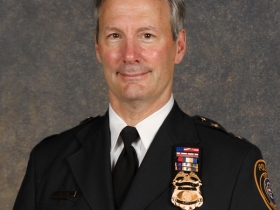Deaths in Custody Decline Under Flynn
Journal Sentinel story criticizing department doesn’t report data showing decline.
Is the Milwaukee Police Department as bad as in the dictatorial days of Chief Harold Breier when it comes to deaths in police custody? You could certainly conclude that from a recent Milwaukee Journal Sentinel story on how the department has handled this issue. The story, following up on the death of Derek Williams in custody, told us there have been periodic reforms in the past 30 years, “But time and again, the department — from commanders to front-line officers — reverts to its old ways once the spotlight fades.”
But a sidebar to the story offers the stunning statistic that under Breier, from 1975 to 1979, 22 people died in police custody. That’s more than four people per year. If the department hasn’t reformed itself in any way, you’d expect that figure to be just as bad today. But the newspaper for some reason chose not to report more recent statistics. So I requested all data on this from both the Fire and Police Commission (which it turns out has no historical data on this) and the Milwaukee Police Department, which was eventually able to retrieve data going back only to 1997.
What does it show? From 1997-2007, there were 16 deaths in police custody, or slightly less than 1.5 deaths in custody per year, far lower than the 4.4 per year under Breier. Under Chief Ed Flynn, from 2008 through most of 2012, there were just four deaths in custody, or less than one per year. These statistics suggest the department has improved significantly when it comes to protecting suspects in custody. They also, once again, suggest the Journal Sentinel’s watchdog reports on the police are slanted and incomplete.
Longtime criminology professor Stan Stojkovic, now dean of the UW-Milwaukee Helen Bader School of Social Welfare, has followed the police department since the days of Breier and notes how the days of lifetime tenure for Breier have gradually switched to a situation where chiefs do not serve that long. He says that some of the reforms reported by Barton were adopted by former Chief Philip Arreola, a progressive, and dropped by his successor, Chief Arthur Jones. By the time Flynn arrived those reforms had been discarded for some time. “That’s part of the problem, you don’t have stability when you don’t have continuity of operations,” Stojkovic notes.
Jones was succeeded by Nannette Hegerty, whom Stojkovic calls a “rabble rouser” who fired 50 or 60 cops. “She fired more cops than all her predecessors combined. She will tell you she did because they were bad cops who needed to be fired.”
Flynn, he says, tried to achieve a balance. “He said we’re not going to be firing cops for chicken shit stuff. But we’re going to hold you accountable.”
Stojkovic says the key thing in holding police accountable is how the supervisors below the chief are handled. “Flynn put things in place to change the culture at the supervisory level,” Stojkovic says.
Nationally, a Department of Justice study found there were just over 2,000 deaths of suspects in custody over a period of three years. The study’s author, Christopher J. Mumola, noted that this was 2,002 deaths “out of almost 40 million arrests over three years,” emphasizing their rarity.
That’s one death in just .005 percent of arrests made. By comparison, there have been 176,000 arrests made by the police on Flynn’s watch and four deaths in custody, or a death in .0023 percent of arrests made, less than half the national rate in that study.
Another sign of progress: Citizen complaints about the Milwaukee police department have also dropped under Flynn, plummeting from 489 in 2007 to 363 in 2009 to 258 in 2011.
There have been some obvious failures, including the death of Derek Williams and the charges against some police for doing cavity searches. But the JS story’s central theme, that nothing has changed regarding deaths in custody since the days of Breier, is quite misleading. It makes a potentially useful story look more like the latest chapter in a JS campaign to drive Flynn out of office.
Thus, Barton once again repeats the charge that the department resisted the newspaper’s public record requests for the squad car video of Williams death for ten months. But as I have previously reported, the department was following state law in this case. “We didn’t come up with that policy out of thin air,” the department’s chief of staff Joel Plant told me, “that’s state law. Any evidence in an ongoing investigation can’t be released.”
Short Takes:
-Stojkovic says Flynn is “probably the most articulate police chief we’ve ever had. But he goes on too long. If he could cut back those gratuitous comments…” That’s what’s gotten the chief in trouble, Stojkovic says.
-If you missed Michael Horne’s last column, it’s a lot of fun and offers the scoop that Radio Milwaukee will be buying a new headquarters for the station in the Fifth Ward.
-For all the complaints about a Democratic bias in the presidential polls, the reality was exactly the opposite. Nate Silver analyzed the polls versus election results and found the vast majority leaned Republican. Some, like Rasmussen, have always leaned that way, but the other issue is how many cell phone users are included in polls. “The roughly one-third of Americans who rely exclusively on cellphones tend to be younger, more urban, worse off financially and more likely to be black or Hispanic than the broader group of voters, all characteristics that correlate with Democratic voting,” Silver notes.
-Silver also projects that when all the votes are counted (some states aren’t finished), those results could push President Barack Obama’s margin in the popular vote to “slightly higher than 3 percent.”
Murphy's Law
-
Top Health Care Exec Paid $25.7 Million
 Dec 16th, 2025 by Bruce Murphy
Dec 16th, 2025 by Bruce Murphy
-
Milwaukee Mayor’s Power in Decline?
 Dec 10th, 2025 by Bruce Murphy
Dec 10th, 2025 by Bruce Murphy
-
Total Cost of Foxconn Is Rising
 Dec 8th, 2025 by Bruce Murphy
Dec 8th, 2025 by Bruce Murphy





















Certainly shows how myopic the Milwaukee Journal Sentinel has been. A little more context please!
As your post demonstrates, perspective is important. A little more curiosity about how everything fits together, relatively speaking, makes a big difference.
Here’s another bit of context that could be revealing…. today, after decades of economic decline the conditions for crime are much worse than in the Breier years.
Given the reporting issues associated with the Flynn-led MPD, it’s difficult to know if in custody deaths have really declined under him. Even if deaths have declined, the known incidents of brutal treatment by some members of the force are concerning. It’s clear that Flynn adopted a force that has serious discipline issues, but he not the Fire and Police Commission have done little to impress upon the force that their sometimes unacceptable and dysfunctional behavior will not be tolerated.
It’s interesting that this week an officer who conducted himself in a highly questionable manner was reinstated by the Commission after the chief fired him.
What message does that send to other officers who might contemplate violating the rules or breaking the law?
Eric Von,
How do you know that Flynn has not made it clear the bad behavior will not be tolerated? The details of these sorts of personnel matters are often not shared with the public.
You say an officer who acted in ” a highly questionable matter ” was reinstated. Ok, so what? Maybe they were reinstated, according to the due process they deserve, for good reason? Maybe not. Your account is just hearsay without a deeper knowledge of the situation.
Finally, I find it hard to believe the executive branch of the police does not make it clear that bad behavior will not tolerated. It’s not not democracy, after-all, the police do not vote for the chief.
Chuck, “Ok, so what?” It’s difficult to converse with someone who just doesn’t get it.
The public record of officers violating department rules and even breaking the law is pretty vast and clear.
I didn’t make up the story about the officer and his questionable behavior. The officer admits as much. Not only that, the chief fired him for what he did. The Fire and Police Commission acknowledged the officers misbehavior, although they determined that firing was too harsh. So he’s back at work with, what most reasonable people would consider poor behavior for a police officer.
What does that say to other officers who might consider doing something against policy?
The blame doesn’t rest soley on the chief; the F&P Commission deserve to share responsibility along with him. The kinds of things that are happening in the MPD shouldn’t be tolerated by this community. If some people are will to accept it, so be it. But some of us won’t stand idly by.